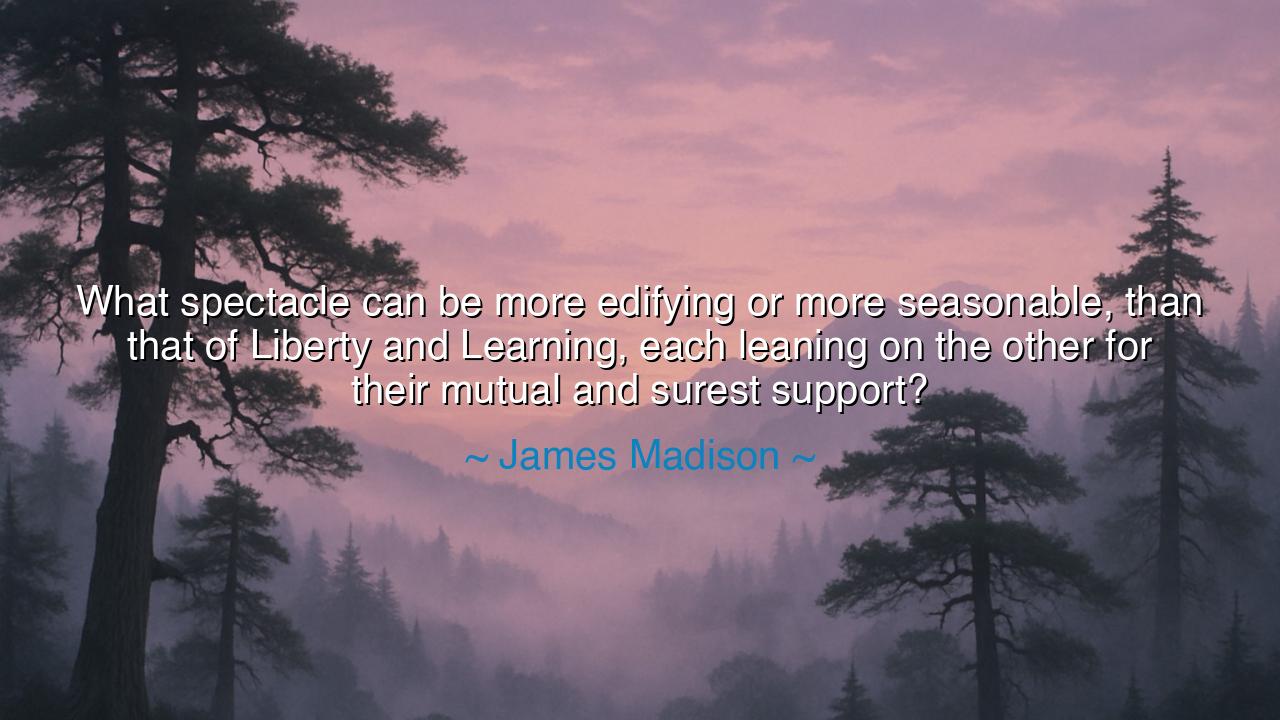
What spectacle can be more edifying or more seasonable, than that
What spectacle can be more edifying or more seasonable, than that of Liberty and Learning, each leaning on the other for their mutual and surest support?






“What spectacle can be more edifying or more seasonable, than that of Liberty and Learning, each leaning on the other for their mutual and surest support?” — James Madison
In these immortal words, James Madison, the philosopher-statesman and father of the American Constitution, reveals the sacred bond between Liberty and Learning — two pillars upon which every enlightened nation must stand. His question is not merely rhetorical; it is a call to reflection, a summons to remember that freedom without wisdom is fragile, and wisdom without freedom is sterile. Madison speaks as one who understood that the prosperity of a people does not spring from might or wealth, but from the harmony between an educated mind and a free spirit. The spectacle he describes — of liberty and learning embracing one another — is not a vision of luxury or pride, but of civilization at its noblest height.
The origin of this thought lies in the crucible of a young republic, when the American experiment in self-government stood uncertain and untested. Madison, a scholar of law, philosophy, and governance, had studied the histories of Greece, Rome, and the fallen empires of Europe. He saw that wherever ignorance triumphed, liberty perished — that despotism feeds upon the uneducated as a wolf upon the flock. From that understanding came his conviction: that the strength of democracy rests not in the sword, but in the mind of the citizen, sharpened by learning, and vigilant in defense of freedom. To preserve liberty, one must educate; to preserve education, one must be free. Each sustains the other, as twin roots draw life from the same soil.
To learn is to awaken the conscience, to perceive the rights of man and the dignity of his soul. Without liberty, such learning would be a candle smothered by oppression. Yet, without learning, liberty becomes reckless, easily swayed by fear and folly. This is why Madison calls their union a mutual support. He understood that tyrants fear the learned, and that ignorance is the loyal servant of tyranny. The uneducated mind can be easily chained, but the enlightened one sees through the mask of power. Thus, wherever the lamp of knowledge burns, the shadow of tyranny fades; and wherever that lamp is extinguished, the darkness of servitude returns.
History bears witness to Madison’s truth. When the Renaissance dawned in Europe, the long night of feudal bondage began to end. The rediscovery of classical learning awakened a hunger for freedom, for inquiry, for the dignity of human reason. The writings of men like Erasmus, Galileo, and Da Vinci broke the chains of dogma and stirred the sleeping soul of mankind. From that soil of learning, the tree of liberty grew. Centuries later, in Madison’s own time, it was education that kindled the spirit of independence — pamphlets, newspapers, and debates spreading ideas that no army could silence. Every revolution of the mind, from Athens to America, has proven that where Learning rises, Liberty soon follows.
But Madison’s warning is eternal, for the bond he describes can also be broken. When nations neglect education, when truth is distorted and reason scorned, Liberty withers like a vine deprived of light. The tyrant’s first act is always to silence the teacher, to close the book, to mock the intellect. In such times, the people become as clay in the potter’s hands, shaped by propaganda and ruled by fear. Yet, when Learning is honored, when the schools flourish and the press speaks freely, liberty grows resilient, self-renewing, and just. The citizen who reads, who questions, who learns — such a one is the guardian of his own freedom, and of his nation’s future.
Consider the story of Frederick Douglass, born in bondage yet set free by the power of learning. As a slave, forbidden to read, he risked punishment and death to teach himself letters. In reading, he discovered the great secret — that knowledge is liberty. He wrote, “Once you learn to read, you will be forever free.” His life proved Madison’s principle: education is the key that opens the prison of ignorance, and liberty is the air that gives knowledge its power. Without learning, Douglass would have remained enslaved in body and in mind; without liberty, his knowledge would have found no voice. Together, they made him immortal.
So, dear seeker, heed this teaching of Madison, echoed through the ages: if you would preserve your freedom, learn; and if you would learn, guard your freedom. Read not only to know, but to think; question not only others, but yourself. Build schools as you would build fortresses, for they defend the soul of the nation. Cherish the free exchange of ideas, for it is the lifeblood of democracy. And remember always that Liberty and Learning, bound in mutual embrace, form the most edifying spectacle the world can behold — the vision of a people enlightened and free, forever renewing the promise of civilization itself.






AAdministratorAdministrator
Welcome, honored guests. Please leave a comment, we will respond soon